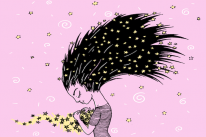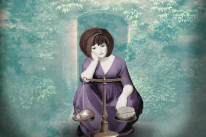
“Emotional pain cannot kill you, but running from it can. Allow. Embrace. Let yourself feel. Let yourself heal.” ~Vironika Tugaleva
Ah, therapy, my old friend. We meet again.
I thought I’d released you from my life. I thought I no longer needed you to maintain my sanity.
I was wrong.
Third time’s a charm, as they say.
The First Time I Went to Therapy
I was eighteen when I had my first encounter with therapy. My parents had just divorced under pretty devastating circumstances, and my first serious relationship had crumbled at my feet.
It was a double betrayal.
My parents had hidden their divorce from me. I found out on our “family holiday” that we weren’t actually a family anymore. Plus, my partner had secretly been seeing another woman. He started dating her publicly less than a week after our five-year relationship ended.
I was young, impressionable, and distraught. My whole life felt like a lie.
I spent weeks wrapped up in the safety of my bed, emerging only to find comfort in food. I dropped out of university. My partner had isolated me from my friends due to his controlling and coercive behavior, which left me feeling totally alone. Everything felt pointless. I had no idea what to do with myself, and my thoughts were starting to scare me. So I sought help.
Finding a therapist was easy. A quick Google search was all it took.
But it took a long time to build up the courage to make an appointment, fill out the pre-session questionnaire, and actually walk into the building.
I remember feeling so much shame. I thought I was weak and ridiculous for not being able to handle my emotions or deal with what was happening—but I also knew that my mental health was on seriously shaky ground.
So I went.
I walked into the therapy room, shaking like a leaf. My heart (and my mouth) were melded shut for the first few sessions. My therapist had to carefully wrench it open to encourage me to open up.
Finally, I did. And when I unburdened myself of all that had been weighing me down, I saw it on her face.
Judgment.
At the end of the session, I walked out of that room and never went back. My worst fear—that someone would see the truth about what was alive inside me and judge me because of it—had been realized. I cursed myself for thinking therapy was a good idea.
And so I tried to forget about my wounds as I unconsciously carried them into the next phase of my life.
The Second Time I Went to Therapy
Six years later, I started having debilitating panic attacks on a daily basis. The problem was I felt more than a little resistance to the idea of going to therapy again.
By this time, my anxiety had steadily increased to the point that it became a normal part of my everyday life.
I expected to be unable to sleep, constantly feel exhausted, and be plagued by fearful, intrusive thoughts. I got used to the fact that I couldn’t relax, always felt irritable, and lashed out at the people I loved—despite desperately craving their support—because I was in so much emotional pain.
And honestly, I thought my anxiety was my edge.
I was completing my master’s degree, and I thought intense stress made me work harder. It felt like a sign I was on the right track. I worked day and night, utterly consumed by my projects. In my head, I was achieving top grades because of my worrying.
So I put the idea of therapy out of my head until eventually, I hit my breaking point.
I had a terrifying panic attack while driving at top speed. Unable to breathe, I pulled over to the side of the road to keep myself (and other drivers) safe. It was my third panic attack that day. I’d finally had enough and knew I couldn’t live like this anymore.
I needed help.
I was still nervous about going back to therapy. But I was also ready to dig—to excavate all the junk I’d been hauling around and declutter my mind.
Instead of going with the first therapist who popped up on Google, I did more research this time. I interviewed different people until I found a therapist I vibed with. And because I wanted to be the ‘perfect’ client, I went above and beyond in my therapy work (a big part of which was working on my perfectionism and my need for external validation. Go figure).
I had a breakthrough. I found a deep sense of inner peace for the first time in my adult life.
My therapist introduced me to mindfulness, meditation, and yoga—healing tools I’m still learning, practicing, and teaching to this day. For that, I’ll be forever grateful.
The Third Time I’m Going to Therapy
These days, I’m in a very different place.
I’m in tune with myself. I listen to my body. I take time to be still. I do everything therapists tell you to do to stay well. I’ve traversed the territory of my suffering, including childhood trauma.
And yet, I’m still human. I struggle.
Specifically, I notice a dynamic playing out in my relationships. I feel intense anxiety about not being enough for my partners and not being worthy of love.
I worry that they’ll find somebody better and want to leave me. I convince myself that they hide things from me and must be secretly planning their escape. I mourn the loss of love before it’s even happened. No matter how much my partners tell me otherwise, it’s still an issue.
After much reflection, I know why—I still don’t feel like I’m enough.
Although I can now recognize it, I need to work on changing that pattern. That’s where therapy comes in.
The difference is that this time, I know where to go for help. I know what type of help to ask for. And, crucially, I feel zero embarrassment about saying I need that help.
The first two times I went to therapy, I stayed quiet and stewed in shame. Here are three reasons I’m telling people about it this time around.
1. Suffering is a universal human experience.
To be human is to suffer.
It’s almost impossible for us to live a gorgeously rich, fulfilling life and emerge from it completely unscathed.
If we open our hearts, we suffer. If we live our truth, we suffer. If we stand up for what’s right—guess what—we suffer.
Our experiences might not look the same. My story isn’t your story. But the core emotions underneath are what we can relate to.
You might not have had a nervous breakdown at university, for example, but you might have had one at work. You might have had one after having a child. You might even have just realized you’re heading toward one.
Maybe you’ve had a panic attack and you know how that feels. Or maybe you can’t stop yourself from worrying, no matter how hard you try.
Our universal experiences connect us to each other.
When I reveal the depth of my suffering, people open up and show me theirs. We dance in our shared humanity and release our burdens together.
Remember this mantra: It’s okay not to be okay. It’s okay to admit I need help and support. We all suffer. Admitting I need help isn’t weak; it’s a brave act of reclaiming my mental well-being.
2. Hearing others’ stories normalizes our struggle.
Listening to other people’s stories—on their blogs, podcasts, or books—helped me to accept, and seek help for, my own suffering.
All too often, I wish I’d heard those stories sooner.
When I was twenty-two and running my own business (after reading The Four Hour Work Week), what if I’d known that the book’s author had planned to end his life and still suffers from depression? Would I have put so much pressure on myself to be successful?
Would I have continued to measure myself against him, thinking I wasn’t doing enough? Or would I have seen him as a fellow imperfect human being and perhaps been more vigilant in managing my mental health?
It’s impossible to know, of course. What I do know is that when people share their stories, it helps others who are going through something similar. Instead of judging them, we feel seen and understood. We feel less alone.
It normalizes suffering. And it normalizes talking about, and getting help for, that suffering.
Remember this mantra: There are plenty of people out there who are experiencing (or have experienced) what I’m going through. If they got through it, so can I. There’s hope for me.
3. There’s nothing to be ashamed of.
The third and most important reason I’m sharing my journey into therapy is simply that I’m not ashamed of it.
I’m no longer concerned with being perfect, masking my truth, or only showing a polished facade.
What’s far more important to me is to show my humanity. To acknowledge my imperfections. To love my flaws. To let my clients and students know that I’m a work-in-progress.
We live in a superficial culture that values appearances above all else. But if all we care about is how our lives look on the outside, we never get to actually live them. We end up spending more time worrying about how many ‘likes’ we get on our Instagram pictures than we do being present in the moment we take them.
In my experience, the road to freedom is letting go of worrying about what others think.
So much of my anxiety was caused by perpetual imposter syndrome. I wanted to be seen as someone who was bulletproof. Someone who navigated the world with ease and confidence. Someone who was wildly successful (without really trying) and looked good doing it.
I worried about being “found out.” I thought if people knew how much I struggled with anxiety and depression, I’d be seen as a fraud and would be exposed as a failure.
But the people who love and appreciate us for who we really are? Who see our vulnerability and accept us anyway? Those are the people we want in our world.
Remember this: There’s no shame in suffering. The people who love me will support me when I need it. It’s safe to be who I truly am and let people see the real me.












 Though I run this site, it is not mine. It's ours. It's not about me. It's about us. Your stories and your wisdom are just as meaningful as mine.
Though I run this site, it is not mine. It's ours. It's not about me. It's about us. Your stories and your wisdom are just as meaningful as mine.
We all need help sometimes., but sadly, some of us for whatever reason, don’t seek it.